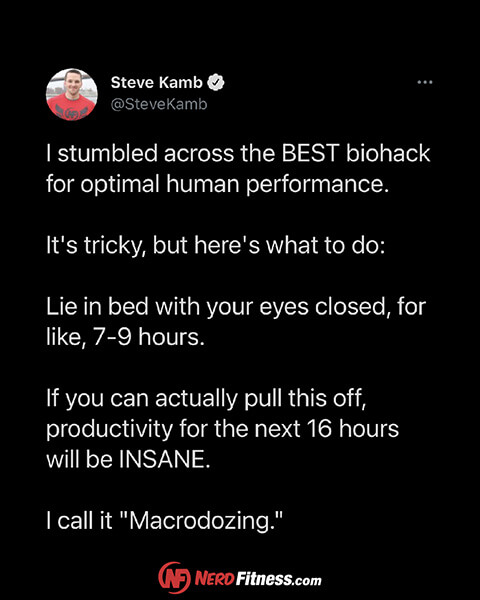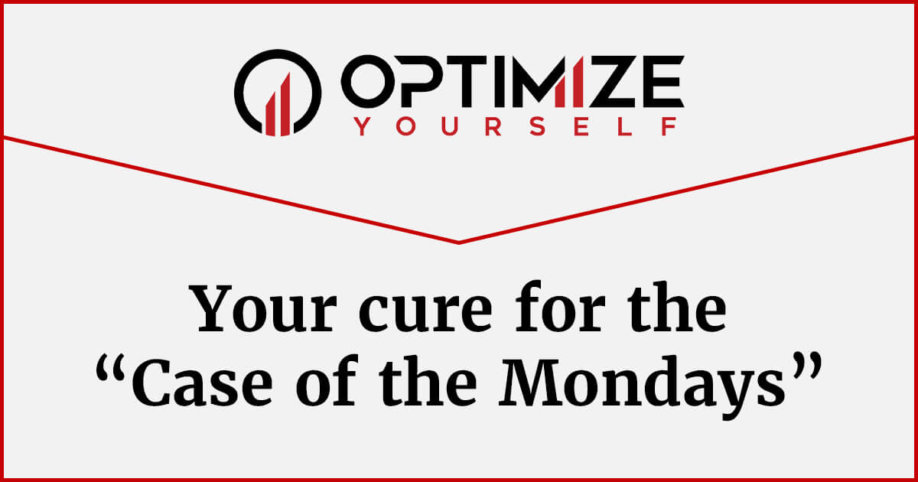In last week’s newsletter I talked about the importance of “going back to the basics,” specifically why staying active throughout an otherwise sedentary workday is so vital to maintaining your energy & creativity. The root of all the work I’ve done over the years sharing health & wellness resources with this community began with movement and fitness specifically for busy creatives, and it’s obviously a passion I continue to share to this day, even if I’ve ratcheted things up a notch from standing desks to ninja warrior training. 🙂
This week I want to discuss what I believe is the most important, vital, and cutting edge “biohack” to optimizing your creativity, your mental health, and your overall well-being. I simply can’t sump it up better than Steve Kamb over at Nerd Fitness:

With how insanely “busy” we have become and how impossible it is to separate “work” from “life” in our post-pandemic reality, everyone is searching for the next great shortcut or biohack to get more done in less time, stay hyper-focused, and do it all without crashing and burning.
But living a fulfilling life that includes a career you love, having regular time away from the job to enjoy hobbies (or obsessions in my case), family, friends, and space left over just for you isn’t about finding shortcuts or cheat codes. Maintaining some semblance of work-life balance is about prioritizing the highest leverage activities that require the minimum amount of effort but get you maximum results.
And let’s be honest – there’s nothing that requires less effort but gets you more results than sleep.
I know, I know…you’re busy.
You’re up against insane deadlines and you’ve been told repeatedly “There is no more time in the schedule. You’ll just have to figure it out.”
But is pulling an all-nighter to deliver your project by some insane, arbitrary deadline worth potentially sacrificing years of your life?
Because that’s what you’re doing when you choose work over sleep.
Burnout and sleep-deprivation go hand in hand, yet our culture has not only come to accept sleep deprivation as an acceptable means to an end – we celebrate our ability to deliver miracles time and time again that make other people rich at the expense of our own well-being and sanity.
I’ve been in the middle of more conversations than I can count where sleep deprivation became a contest about who worked the hardest, put in the most long hours and late nights, and who got to wear their sleep deprivation badge of honor the proudest.
But let’s flip the script for a second here…
Would it be acceptable after a long night of drinking to tell war stories of how many shots you took the night before and how buzzed you still were at the office the next day?
Um no. In fact, you’d probably get fired.
Yet according to extensive scientific research, if you are chronically getting 6 hours of sleep or less per night, you are cognitively drunk.
Read that again.
→ If you are chronically getting less than 6 hours of sleep per night, you are cognitively functioning at the same level as someone who’s blood alcohol level would classify them as legally drunk.
Even more, chronic sleep deprivation – specifically in those who work the graveyard shift – has been classified as a Group 2A carcinogen. Yeah you read that right…not getting enough sleep can literally cause cancer.
If there is one boundary I set mercilessly no matter what, it’s sleep.
I don’t care how tight the deadline is, how important my workout is for the day that I haven’t gotten to yet, how deep I’ve gone down the doom-scrolling hyperlink rabbit hole, or how good a show is (such that I need to watch “just one more episode!”), sleep is absolutely and unequivocally non-negotiable.
If I don’t get at least 7 1/2 hours every night (preferably 8+), I’m sacrificing hours – and sometimes even days – of wasted productivity.
And it’s because of – not despite the fact – that I sleep 8+ hours a night I’m able to work a full-time job on Cobra Kai, run a coaching a mentorship program, record regular podcast interviews, train for American Ninja Warrior, spend time with my family, and STILL have time to veg out in front of the TV for at least a couple episodes every night.
Trust me – you figure out sleep, and everything else will begin to fall into place.
And this isn’t just my opinion, this comes from the leading experts in the world on sleep, athletic performance, and even a physician to the Navy Seals.
My Top 3 Podcasts On the Importance of Sleep
How to Sleep Smarter | with Shawn Stevenson
Advanced Sleep Technology and Biohacking | with Ben Greenfield
And for those of you who love data and tracking, by far the #1 product I recommend to track both your sleep and your health is the Oura Ring. And yeah…I might just have a podcast interview for that too. 😉
One Sleep Tracker to Rule Them All…the Oura Ring | with Chuck Hazzard
Given how important sleep is to optimizing your creativity, what is one basic habit you can introduce into your life starting TODAY that can help you prioritize sleep & recovery?
Be well.
Zack Arnold
Creator, Optimize Yourself

